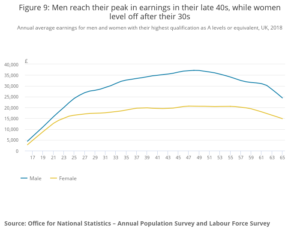Gender pay gap hits older women

Women paid £260,000 less than men over their care. According to official figures, women get paid just £380,000 over the course of their careers compared to £643,000 for men.
Office for National Statistics’ Human Capital Estimates report reveals a huge inequality. Even at the highest levels of educational attainment between women and men. Women with a master’s or PhD degree still made one-third less than men with the same qualification over their lifetimes.
The ONS said, “Women aged 26 to 35 years with higher degrees have average lifetime earnings of £803,000, whereas men of the same age with undergraduate level qualifications have average lifetime earnings of around £1,160,000,”.
This has increased over the last 15 years “with women now receiving, on average, 59% of men’s average lifetime earnings; this is up from 56% in 2004.”
The ONS states that even after adjusting the hours worked, women were paid about a fifth less than men over their lifetime. “Taking account the effect of weekly hours worked for men and women, women’s human capital is 22.7% lower than men’s,”.
Women won’t see the effect in their late teen early 20s as they receive the same pay during this period. It is after this they will see the effects. Those aged 16-65 whose highest level of education is A-level or equivalent, will see the gap peak aged 48. Men received £16,600 more than the average women at this point.
Working patterns

The figures reflect differences in working patterns. With more women working part-time reflecting the lower lifetime earnings. In a separate analysis this year, the pay gap for 18-39-year-olds who work full time had fallen to almost zero. Gender pay gap rises after the age of 30 this corresponding with an increase of part-time workers as this age. The figures did not show difference in rates of pay for comparable jobs. As they were affected by several aspects such as part-time or in different occupations. “For example, a higher proportion of women work in occupations such as administration and caring, which tend to offer lower salaries,” it said.
Why figures have arisen
The figures have arisen after one of BBC’s most prominent female presenters Samia Ahmed, takes the broadcaster to an employment tribunal. Due to claims that she got paid less for doing the equivalent work than her fellow male colleagues. Women having lower lifetime earning will translate to lower pensions. In separate research, women in the UK last year received less than half the investment income received by men, according to Salisbury House Wealth.



